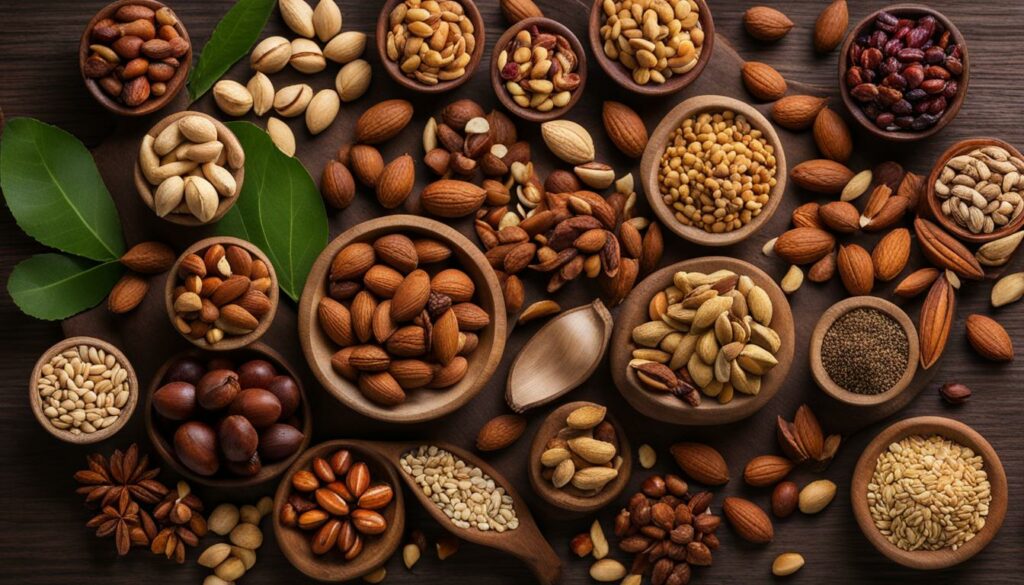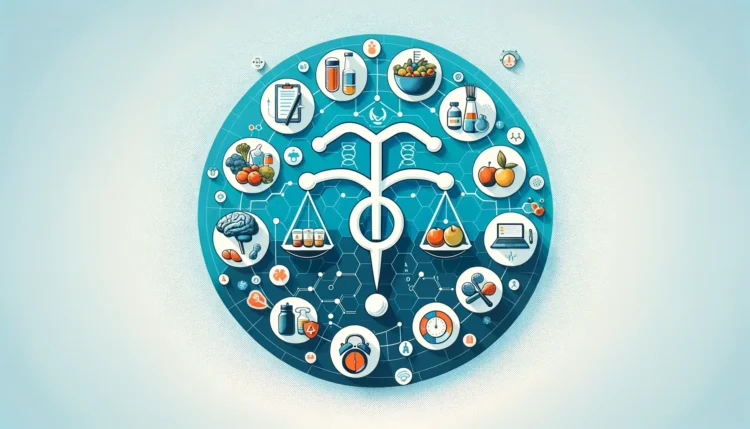Testosterone balance is essential for overall health and well-being. This steroid hormone, primarily produced in the testicles and ovaries, affects physical changes during puberty and plays a crucial role in sexual function and overall health in adulthood.
Both males and females require optimal testosterone levels to function at their best. While testosterone therapy and supplements are available options, achieving testosterone balance naturally is possible through various methods.
Achieving hormonal balance and hormone optimization is crucial for maintaining healthy testosterone levels. By implementing the following key tips and insights, individuals can support their testosterone production and ensure optimal levels:
Key Takeaways:
- Exercise, especially weightlifting and high-intensity interval training, can significantly increase testosterone levels.
- Nutrition plays a crucial role in maintaining healthy testosterone levels. Including foods rich in nutrients like vitamin D, zinc, and magnesium can support testosterone production.
- Managing stress through techniques like meditation and deep breathing can help maintain optimal hormone levels and support testosterone balance.
- Adequate vitamin D intake is essential for testosterone balance. Sunlight exposure and foods like fatty fish, eggs, and dairy products can provide this vital nutrient.
- Supplements such as zinc and certain herbal supplements may have a positive impact on testosterone balance, but consulting a healthcare professional is recommended before starting any new regimen.
By adopting a holistic approach and embracing a healthy lifestyle that incorporates exercise, proper nutrition, stress management, sufficient sleep, and hormone-friendly habits, individuals can achieve and maintain testosterone balance naturally.
Always consult with a healthcare professional for personalized guidance that suits individual needs and goals.
Exercise and Weightlifting for Testosterone Boosting
Regular physical activity, including exercise and weightlifting, plays a crucial role in optimizing testosterone levels. Engaging in physical activity has been found to be more effective than simply focusing on calorie restriction alone when it comes to boosting testosterone.
Resistance training, such as weightlifting, has a short-term impact on testosterone levels, while high-intensity interval training and all forms of exercise contribute to increased testosterone production over time.
These activities stimulate the muscles and signal the body to produce more testosterone, leading to a variety of benefits for hormonal balance.
One of the significant advantages of exercise is the increase in muscle mass and strength. Weightlifting, in particular, helps build and maintain muscle, which is essential for overall health and vitality.
By regularly engaging in resistance training, individuals can not only enhance their physical appearance but also optimize their testosterone levels, promoting a balanced hormonal profile.
| Type of Exercise | Effect on Testosterone Levels |
|---|---|
| Weightlifting | Short-term impact on testosterone levels |
| High-intensity Interval Training | Stimulates testosterone production |
| All Forms of Exercise | Contributes to increased testosterone production |
| Muscle Building | Enhances muscle mass and strength |
Whether you prefer hitting the gym, participating in team sports, or engaging in high-intensity interval training, finding an exercise routine that suits your lifestyle and interests is crucial.
By incorporating exercise and weightlifting into your regular routine, you can reap the benefits of increased testosterone levels, improved muscle mass, and enhanced strength.
Testosterone-Boosting Exercises:
- Weightlifting and resistance training
- High-intensity interval training (HIIT)
- Sprinting and fast-paced cardio
- Compound exercises such as squats, deadlifts, and bench presses
- Plyometric exercises like jump squats and box jumps
By incorporating these exercises into your fitness routine, you can optimize your testosterone levels and enjoy the numerous benefits of increased muscle mass and strength.
Nutrition and Testosterone Levels
Proper nutrition plays a crucial role in maintaining healthy testosterone levels. Consuming a well-rounded diet that includes adequate amounts of protein, healthy fats, and carbohydrates can support testosterone production.
When it comes to diet, it’s important to focus on nutrient-rich foods that provide the building blocks necessary for testosterone synthesis. Here are some key nutrients that play a vital role in testosterone balance:
Zinc
Zinc is an essential mineral that is involved in testosterone synthesis. It supports the production of luteinizing hormone, which stimulates testosterone production in the testes.
Including foods rich in zinc, such as oysters, beef, chicken, and pumpkin seeds, can help increase testosterone levels. Supplementation may also be beneficial for those with zinc deficiencies or suboptimal levels.
Magnesium
Magnesium is another important mineral for testosterone production. It helps regulate testosterone levels by inhibiting the binding of testosterone to sex hormone-binding globulin (SHBG), thereby increasing the amount of bioavailable testosterone in the body.
Good food sources of magnesium include dark leafy greens, nuts, seeds, and whole grains.
Vitamin D
Vitamin D deficiency has been linked to low testosterone levels. It is essential for the production of testosterone and acts as a steroid hormone in the body. Exposure to sunlight is the best natural source of vitamin D, but it can also be obtained through foods like fatty fish, eggs, and fortified dairy products.
Supplementation may be necessary for individuals with low vitamin D levels.
Healthy Fats
Healthy fats, such as those found in avocados, olive oil, nuts, and fatty fish, are important for testosterone production. Testosterone is synthesized from cholesterol, so including adequate amounts of healthy fats in your diet can ensure a sufficient supply of cholesterol for hormone synthesis.
Overall, a balanced diet that includes a variety of nutrient-dense foods is key to supporting testosterone production. By incorporating zinc, magnesium, vitamin D, and healthy fats into your diet, you can optimize testosterone levels and support overall hormonal health.

| Nutrient | Food Sources |
|---|---|
| Zinc | Oysters, beef, chicken, pumpkin seeds |
| Magnesium | Dark leafy greens, nuts, seeds, whole grains |
| Vitamin D | Fatty fish, eggs, fortified dairy products |
| Healthy Fats | Avocados, olive oil, nuts, fatty fish |
Stress Management and Cortisol Levels for Optimizing Testosterone
Chronic stress can have a detrimental impact on testosterone levels by increasing cortisol, a hormone that has an inverse relationship with testosterone. When cortisol levels are high, testosterone levels tend to be low. This imbalance can disrupt hormone production and negatively affect overall health and well-being.
Maintaining optimal hormone levels requires effective stress management techniques. By incorporating stress management strategies into your daily routine, you can reduce cortisol levels and promote testosterone balance. Here are some stress management techniques that can help optimize testosterone:
- Meditation: Practicing meditation on a regular basis can help calm the mind, reduce stress, and lower cortisol levels. Find a quiet space, sit comfortably, and focus your attention on your breath or a specific mantra. Start with a few minutes a day and gradually increase the duration.
- Yoga: Engaging in yoga poses, deep stretches, and controlled breathing exercises can alleviate stress, improve flexibility, and support hormone balance. Yoga has been shown to reduce cortisol levels and promote a sense of calmness.
- Deep Breathing: Taking deep breaths and focusing on your breath can activate the body’s relaxation response, reducing stress and cortisol levels. Practice deep breathing exercises throughout the day, especially during stressful situations.
In addition to stress management techniques, adequate sleep is crucial for optimizing testosterone levels. Poor sleep quality or insufficient sleep can lead to decreased testosterone production. Aim for 7-8 hours of quality sleep each night to support hormonal health and promote testosterone balance.
To summarize, chronic stress can disrupt testosterone balance by increasing cortisol levels. Managing stress through techniques like meditation, yoga, and deep breathing can help lower cortisol levels and promote optimal hormone levels.
Additionally, prioritizing adequate sleep is essential for maintaining healthy testosterone production. By incorporating these stress management strategies into your daily routine, you can optimize testosterone levels and support overall well-being.
Importance of Vitamin D for Testosterone Balance
Vitamin D is a crucial nutrient for maintaining optimal testosterone levels. Research has shown that low levels of vitamin D are associated with decreased testosterone production, leading to potential testosterone deficiency.
Therefore, ensuring adequate vitamin D intake is essential for supporting overall hormonal health and testosterone balance.
Sunlight exposure is the most natural and efficient way for our bodies to produce vitamin D. Spending time outdoors and soaking up the sun’s rays can help boost vitamin D levels, which in turn supports healthy testosterone production.
However, it’s important to strike a balance and be mindful of protecting your skin from excessive sun exposure to avoid sunburn and skin damage.
If sunlight exposure is limited due to factors such as climate, work, or lifestyle, vitamin D supplementation can be an effective alternative to maintain optimal levels. Discussing with a healthcare professional regarding the appropriate dosage and form of supplementation is recommended.
In addition to sunlight exposure and supplementation, certain foods can also provide vitamin D. Fatty fish like salmon and mackerel, eggs, and dairy products are excellent dietary sources of vitamin D. By incorporating these foods into your diet, you can further support your testosterone balance and overall hormonal health.
Benefits of Vitamin D for Testosterone Balance:
- Enhances testosterone production
- Supports overall hormonal health
- Contributes to maintaining optimal testosterone levels
Remember, maintaining adequate vitamin D levels is important for optimizing testosterone balance. Whether it’s sunlight exposure, supplementation, or incorporating vitamin D-rich foods into your diet, prioritizing vitamin D intake can positively impact your overall hormonal health and well-being.

Supplements and Their Impact on Testosterone Levels
Certain supplements can be beneficial in supporting healthy testosterone levels, especially for individuals with deficiencies or imbalances. These supplements can offer natural and effective ways to optimize testosterone and improve overall hormone balance.
Zinc supplementation, for instance, has shown promising results in increasing testosterone levels and enhancing sexual function.
Additionally, several herbal supplements have been studied for their potential positive effects on testosterone balance. Saw palmetto, ginger, and ashwagandha are among those that have gained attention for their potential benefits.
While more research is needed to fully understand their impact on testosterone levels, early studies suggest they may contribute to improved hormone balance.
It is important to note that individual responses to supplements may vary, and consulting with a healthcare professional is essential before incorporating any new supplements into your routine. They can provide personalized guidance based on your specific needs and help ensure safe and effective supplementation.
| Supplement | Potential Benefits |
|---|---|
| Zinc | Increased testosterone levels Improved sexual function |
| Saw Palmetto | Possible hormone balancing effects Supports prostate health |
| Ginger | Antioxidant properties Potential hormone regulation |
| Ashwagandha | Possible stress reduction Boosts energy levels |
Conclusion
Maintaining optimal testosterone levels is crucial for overall health and well-being. In order to achieve testosterone balance naturally, it is important to adopt a holistic approach and embrace a healthy lifestyle.
This includes incorporating regular exercise, following a proper nutrition plan, practicing stress management techniques, getting sufficient sleep, ensuring an adequate intake of vitamin D, and maintaining a healthy weight.
By engaging in regular physical activity, such as weightlifting and high-intensity interval training, individuals can boost their testosterone levels while also improving muscle mass and strength.
A well-rounded diet that includes adequate amounts of protein, healthy fats, and carbohydrates is also essential for supporting testosterone production. Nutrients like vitamin D, zinc, and magnesium play key roles in hormone balance, and can be obtained from foods such as fatty fish, eggs, and dairy products.
Managing stress levels and getting enough sleep are also crucial for maintaining healthy testosterone levels. Chronic stress can negatively impact testosterone levels by increasing the production of cortisol, while insufficient sleep has been associated with lower testosterone levels.
By implementing stress management techniques like meditation and deep breathing, as well as ensuring a consistent sleep schedule, individuals can support their hormone balance.
Taking a holistic approach to testosterone optimization and adopting a healthy lifestyle can have long-lasting benefits on hormonal health and overall well-being. However, it is important to remember that each person may respond differently to these lifestyle factors.
Consulting with a healthcare professional can provide personalized guidance and help individuals create a tailored approach to achieving and maintaining optimal testosterone levels.
FAQ
What is testosterone?
Testosterone is a steroid hormone produced in the testicles and ovaries, with small amounts produced by the adrenal glands.
Why is testosterone important for overall health?
Testosterone plays a crucial role in overall health and sexual function in adulthood, and optimal levels are important for both males and females.
How can I naturally increase testosterone levels?
You can increase testosterone levels naturally through various methods, such as exercise, proper nutrition, stress management, adequate sleep, vitamin D intake, weight loss, and avoiding estrogen-like chemicals and excessive alcohol consumption.
Does exercise help boost testosterone levels?
Yes, exercise, especially weightlifting and high-intensity interval training, can significantly increase testosterone levels. Regular physical activity has been found to be more beneficial than calorie restriction for boosting testosterone levels.
How does nutrition affect testosterone levels?
Proper nutrition plays a crucial role in maintaining healthy testosterone levels. Consuming a well-rounded diet that includes adequate amounts of protein, healthy fats, and carbohydrates can support testosterone production. Nutrients such as vitamin D, zinc, and magnesium are particularly important for testosterone balance.
Can stress affect testosterone levels?
Yes, chronic stress can negatively affect testosterone levels by increasing cortisol, which has an inversely proportional relationship with testosterone. Managing stress through techniques like meditation, yoga, and deep breathing can help maintain optimal hormone levels.
Why is vitamin D important for testosterone balance?
Vitamin D plays a vital role in testosterone production. Low levels of vitamin D have been linked to decreased testosterone levels. Sunlight exposure is the best source of vitamin D, but it can also be obtained through supplements or foods such as fatty fish, eggs, and dairy products.
Can supplements support healthy testosterone levels?
Yes, certain supplements like zinc have been found to increase testosterone levels and improve sexual function. Other herbal supplements like saw palmetto, ginger, and ashwagandha may also have a positive impact on testosterone balance, but further research is needed. It is important to consult with a healthcare professional before starting any new supplement regimen.
How can I achieve testosterone balance naturally?
By incorporating exercise, proper nutrition, stress management, sufficient sleep, vitamin D intake, weight management, and avoiding certain substances, individuals can achieve testosterone balance naturally. It is advisable to consult a healthcare professional for personalized guidance.




